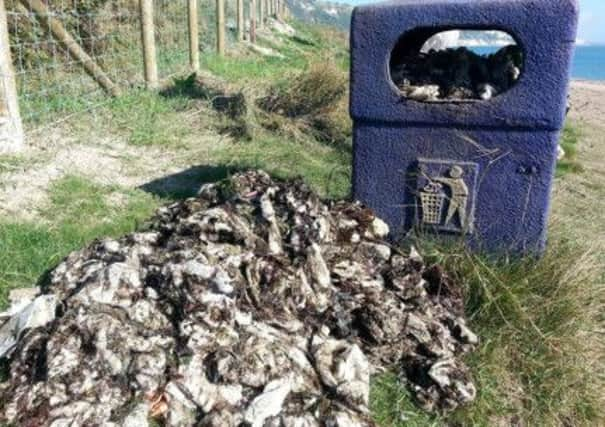Scottish beaches blighted by rising bathroom waste


The latest figures show there has been an overall drop in the amount of litter found on Scottish shores, but the proportion of sewage-related debris nearly doubled in a year and is the highest in the country.
Items such as nappies, cotton buds, condoms and wet wipes accounted for 14 per cent of all trash found rubbish a UK-wide beach clean in 2014, jumping from 7.4 per cent a year earlier.
Advertisement
Hide AdAdvertisement
Hide AdThe survey, organised by the charity Marine Conservation Society (MCS), uncovered a shocking rise in the quantity of wet wipes being flushed out of toilets north of the Border, the proportion more than trebling in 12 months.
Bathroom waste was especially serious around heavily populated estuaries such the Firth of Forth, according to the environmentalists behind the report.
Part of the problem was the increasing number of wipes billed as flushable, according to Calum Duncan, Scotland programme manager for MCS.
He said the only things that should go round the U-bend were “the three Ps – pees, poos and paper”, he said.
“Our sewerage systems weren’t built to cope with wet wipes. When flushed, they don’t disintegrate like toilet paper, and they typically contain plastic, so once they reach the sea they last for a very long time.”
He warned that by throwing wipes down the toilet, unwitting householders were not only harming the environment, they were also risking unpleasant repercussions.
He said: “They can cause blockages in our sewers, and then everything else that has been flushed down the loo can either back up into people’s homes or overflow into rivers and seas.
“Overflows also happen during excessive rainfall, or if the plumbing hasn’t been connected up properly, meaning the wrong pipes are heading straight to the sea. That is when we find sewage-related debris, including wet wipes, on the beach.”
Advertisement
Hide AdAdvertisement
Hide AdOf all the beaches studied, Edinburgh’s were most littered, with more than 13,000 items covering every kilometre of coastline. This is more than seven times the Scottish average of 1,800 and over five times higher than the UK as a whole.
The increase in wipes was reflected in the total amount of rubbish found on beaches nationwide last year, which rose by 6.4 per cent to 2,457 bits of litter on every kilometre cleaned. This compared with 2,309 in 2013.
Many unexpected items were discovered. These included a colostomy bag, a plastic hand, part of sea defences from the Second World War, a piping gun nozzle, a bra strap and, on one beach alone, nine pairs of shoes in various sizes.
A clean-up in Arbroath threw up an entire meal, with raspberries, orange slices, eggs and salad all dumped in the harbour – though biodegradable items were not included in the count.
Scottish Water, which is responsible for the country’s sewage network, is running an ongoing campaign warning people of the hazards of putting unsuitable items down the toilet.
The firm’s Chris Wallace said: “While there has been a welcome drop in beach litter, it’s clear that we all need to play our part in disposing of sanitary items like wipes and cotton buds in the correct way.
“As well as contributing to beach litter, these items, along with cooking fats and oils, can block pipes – sometimes leading to costly flooding in the home.”
He said the campaign showed “simple steps everyone can take to keep the water cycle running”.
FOLLOW US
SCOTSMAN TABLET AND MOBILE APPS